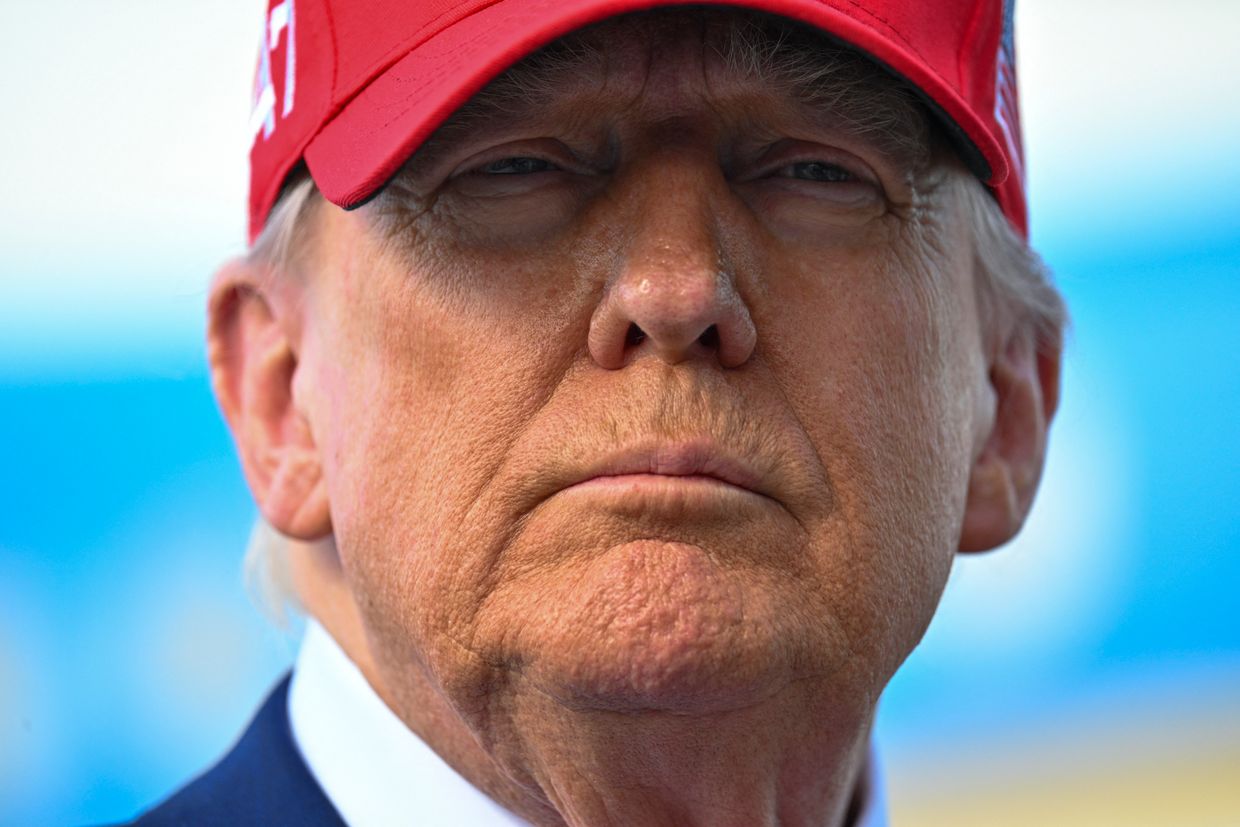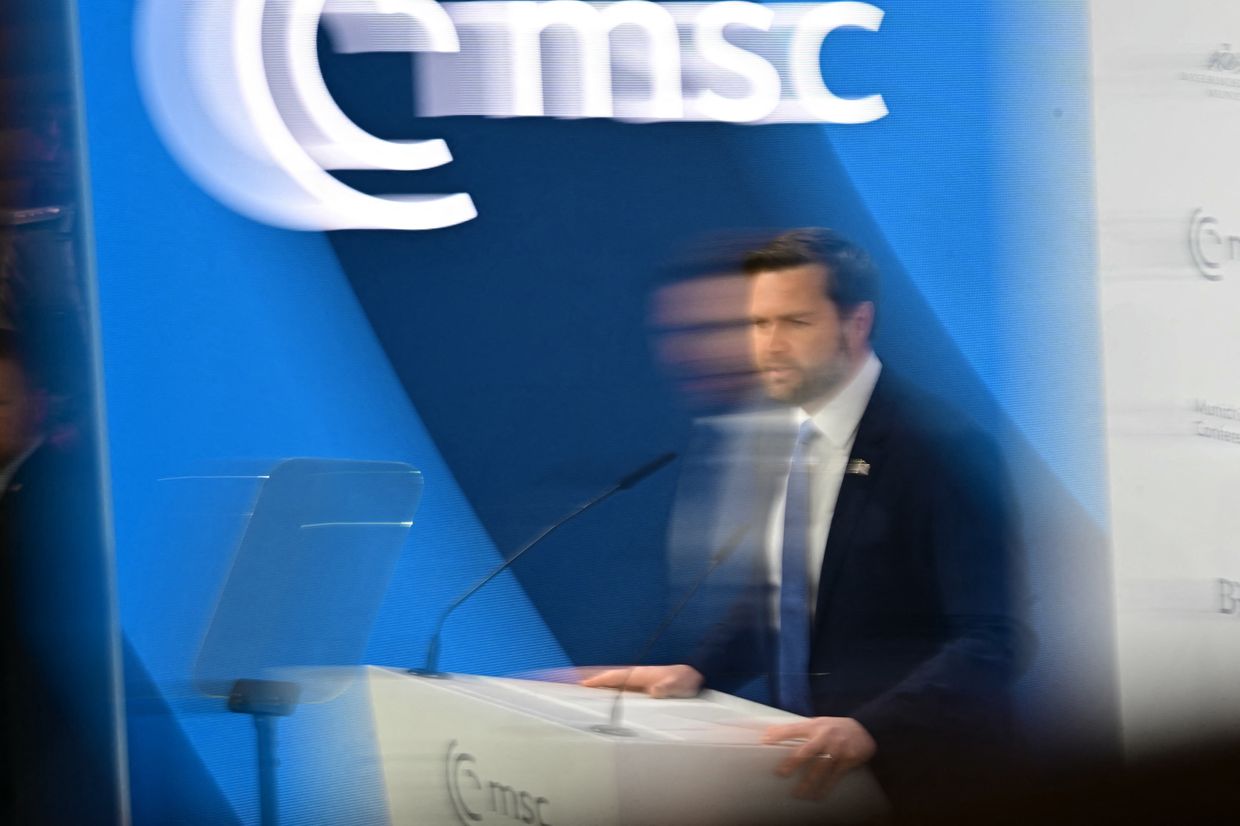The second line of the Ukrainian national anthem — “Fate/luck still smiles on us, fellow Ukrainians” — sadly no longer holds. Much worse, we should extend this retreat of luck to Europe itself: Fate/luck no longer smiles on us, fellow Europeans. The situation is now so serious that the same old points should be repeated again and again—perhaps they will find more resonance today now that the crisis has broken out openly.
To anyone who follows our media, it is more than obvious how U.S. President Donald Trump’s new administration has thrown our time out of joint in both domestic and foreign policy. But why should Europe be the one chosen to set the time straight? The reason is not just that it seems to be the big loser of Trump’s new global politics.
Some of us still remember the famous opening of “The Communist Manifesto”: “A specter is haunting Europe — the specter of communism. All the powers of old Europe have entered into a holy alliance to exorcise this specter: Pope and Tsar, Metternich and Guizot, French Radicals and German police-spies...”
Could we not use the same words to characterize the status of “Europe” in today’s public perception? A specter is haunting the world — the specter of Eurocentrism. All the powers of old Europe and of the new world order have entered into a holy alliance to exorcise this specter: Nigel Farage and Russian President Vladimir Putin, AfD and Hungarian Prime Minister Viktor Orbán, pro-immigrant anti-racists and protectors of traditional European values, Latin American leftists and Arab conservatives, West Bank Zionists and Chinese “patriotic” communists…
There is a profound similarity between Trump’s attacks on the triad of environmentalism, political correctness, and LGBT+ rights and the conflict between Russia and Europe. One should ask a simple question: Which civilization today fully embodies the triad attacked by Trump? Only one: European civilization, as the latest form of Enlightenment.
In an interview on July 15, 2018, just after a stormy meeting with EU leaders, Trump mentioned the European Union as the first in the line of “foes” of the U.S., ahead of Russia and China. What Trump tries to do is dissolve European unity, and his efforts are finding an echo in more and more European states (Hungary, Germany, Austria, the U.K.).
During the Munich Security Conference, the first act of U.S. Vice President JD Vance was to launch a brutal ideological assault on Europe, accusing its leaders of suppressing free speech, failing to halt illegal migration, and running in fear from voters’ true beliefs. He openly questioned whether current European values warranted defense by the U.S.
“Europe” today is a terrain of ideological and political struggle. Many ideas of Europe compete and exist in a kind of superposition: the conservative notion of Europe as a space of Christian sovereign states, the technocratic vision of Europe as an economic unity, and more.
So which Europe bothers Trump as well as European populists? It is the Europe of transnational unity, the Europe vaguely aware that, to cope with the challenges of our moment, we must move beyond the constraints of nation-states. It is the Europe that also desperately strives to remain faithful to the old Enlightenment motto of solidarity with victims, the Europe aware that humanity is now one — that we are all on the same boat (or, as we say, on the same Spaceship Earth), so that others’ misery is also our problem.
This brings us to the scandalous performance called the Munich Security Conference. Timothy Garton Ash raised the question apropos of the Munich conference: “Will the peace be like Chamberlain’s peace for our time?”
My answer is that it could turn out to be even worse because our time is a new time of BRICS multipolarity. Both prospects of peace in which Trump’s administration is now engaged — Gaza and Ukraine — are exemplary cases of how the BRICS world that is now emerging will function. Yes, it will be multipolar, but in the sense of a few strong states each defining its own sphere of influence and limiting the sovereignty of its smaller neighbors. Trump’s foreign policy fully fits the BRICS world: He admits Ukraine is in Russia’s sphere of influence while insisting that Canada, Greenland, Mexico, and Panama are in the U.S. sphere of influence.
"He (Trump) admits Ukraine is in Russia’s sphere of influence while insisting that Canada, Greenland, Mexico, and Panama are in the U.S. sphere of influence."
That’s why he immediately engaged in negotiations with Putin, openly excluding Europe from peace talks. Even when Trump and Putin disagree on many things, they already speak the same language. No wonder Trump also said that Russia should rejoin the G7, signaling a general re-normalization of Russia. So it is not just that Europe should unite to become one more big power within the BRICS space; it should become an exception, a place that offers support to the victims of the new BRICS superpowers, each of which defines its own sphere of influence.
The announced U.S. takeover of Gaza demonstrates what happens within a superpower’s sphere of influence: To put it bluntly, you do what you want, dropping all pretense. When Trump announced his plan to take over Gaza, we found ourselves back at the two-state solution rejected by Israel, only with one minor detail changed: The two states are not Israel and Palestine but Israel and the United States.
So what will happen if Trump succeeds and peace prevails in an ethnically cleansed greater Israel? Shakespeare wrote, “The evil that men do lives after them; the good is oft interred with their bones.” The horror with Trump is even worse: If his evil deeds succeed, they will be remembered as good, as something that brought peace.
The peace plan advocated by the U.S. will leave Ukraine caught between two colonizations. The eastern part will be directly annexed by Russia, while the western part will be turned into a de facto economic colony, with large portions of its fertile land already owned by Western corporations, its natural resources plundered, etc. For Trump, a “peace guarantee” means guarantees from both sides (Ukraine and Russia) that the U.S. will have free access to Ukraine’s natural resources to cover the costs of its military aid to Ukraine. So Russia will keep (part of) its cake, and the U.S. will eat (part of) it, with Ukraine left with nothing — at best, some symbolic titles.

So what can Europe do in what former Greek Finance Minister Yanis Varoufakis describes as “Europe's last chance to seize autonomy from the U.S.?” Many things. Regarding Gaza, Europe could go beyond condemning the Trump takeover and simply organize a large relief operation, bringing food, medical equipment, tents, and other necessities by sea and from Egypt. If the U.S., not just Israel, were to block this aid, the already obvious truth would be even harder to ignore.
As for Ukraine, Europe must draw the consequences of what Ukrainian President Volodymyr Zelensky said in Munich on Feb. 15, 2025: “Let’s be honest. Now we can’t rule out the possibility that America might say no to Europe on an issue that threatens it. Many, many leaders have talked about Europe needing its own military — an army of Europe.”
Ukraine now faces a difficult choice between the U.S. and Europe. Until now, it has been able to rely on both, but the crack is now wide open. The U.S. message is clear: negotiations will begin between Washington and Moscow, with Kyiv joining later — its role reduced to signing whatever the two major powers decide. The implicit threat? If Kyiv refuses, it will be left to fend for itself — alongside Europe, which is conspicuously excluded from the talks, despite the war unfolding on its soil. Statements by U.S. Vice President JD Vance against Europe make it clear that the real target of the U.S.’ shift on Ukraine is not Ukraine itself but Europe — specifically, its emancipatory legacy.
"The U.S. message is clear: negotiations will begin between Washington and Moscow, with Kyiv joining later — its role reduced to signing whatever the two major powers decide."
The question that lingers behind all this is: Will Putin take the negotiations seriously at all, or are they just another step in Russia’s continuous expansion? The answer is not buried deep in Russia’s soul — it depends largely on how others respond to Russian politics.
So, again, what should and could Europe do to assert itself as an autonomous power? First, Europe must clearly (re)define itself — and here, problems already arise, with states and populist forces opposing both a united Europe and its emancipatory legacy.
Second, part of this redefinition is military autonomy. John Bolton predicts that Trump will withdraw the U.S. from NATO — let’s hope this happens and NATO becomes the armed force of a united Europe.
Third, Europe will have to rethink its economic policy toward greater coordination and—to use the prohibited word—planning. Large-scale, obligatory planning, not just vague “coordination” or “collaboration,” is the only way to confront the crises threatening our very survival.
Planning in times of multiple crises must combine features that may appear mutually exclusive: while outcomes cannot be fully predicted, let alone planned, this very unpredictability demands rigorous preparation. In short, even though crises cannot be planned, they require a great deal of planning.
After carefully outlining competing tendencies, we must act with full awareness that unexpected consequences may force us to shift course. Does this sound utopian? Absolutely not — just look at some of the world’s most successful economies, where the state plays a central role in regulating and directing economic activity, from Switzerland and Singapore to South Korea.
In other words, the stance Europe should adopt today is one of principled pragmatism. Groucho Marx once said, “These are my principles, and if you don’t like them… well, I have others.” This is the formula of unprincipled pragmatism — when those in power change their principles merely to stay in power.
In the ongoing negotiations about peace in Ukraine, Trump presents himself as a pragmatic realist, urging all sides to choose the lesser evil. But as none other than Jerry Garcia put it, “Constantly choosing the lesser of two evils is still choosing evil.”
On the other hand, there is the dogmatic advocacy of principles — sticking to them even at the cost of economic and social disruption. Principled pragmatism does not seek a middle ground between these two extremes; it means something much more precise: when circumstances change radically, we must adjust many of our particular positions precisely to remain faithful to our core principles.
For Europe, the principle at stake is unconditional fidelity to the Enlightenment legacy, while the pragmatic aspect involves navigating unpredictable and difficult decisions. Europe is clearly no longer treated as the U.S.’s primary ally, so one option to consider is a strategic alliance with China against the emerging axis of the U.S., Russia, and India. Although China is closer to Russia in the war against Ukraine, it has sent clear signals that it does not fully support Russia’s aggressive politics.
Europe should seize this crisis as an opportunity to reassert itself and regain strength. French President Emmanuel Macron was right to convene an urgent summit of European leaders in Paris, but the real question is how far this group can and will go. Will it be just another declaration — an excuse to do nothing? In recent decades, Europe has been full of such declarations.
So my conclusion is not cautiously optimistic but pessimistic — with a hope that miracles can still happen. The battle is almost lost, but not yet fully lost. We constantly hear that Europe is lagging behind the U.S. and China in digitalization and AI. However, sometimes being late is an advantage: it allows us to watch others make inevitable mistakes and enter the process in a more informed way. It is here that we should recall Nietzsche’s maxim: “What doesn’t kill me makes me stronger.”














